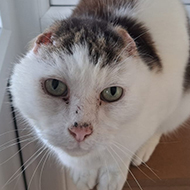
Charity highlights the dangers of sun exposure.
National feline charity Cats Protection has issued a warning after an elderly cat underwent ear amputation due to sun-induced cancer.
Thirteen-year-old Phillip was brought into the care of Cats Protection Kent after he was found living on the streets of Bredhurst.
Stacey Gausten, deputy manager at the Bredhurst centre, said: “Phillip’s ears were curly crispy. This is a tell-tale sign of sun damage and can indicate skin cancer, so our vet determined that both ears would need to be removed as a precaution.
“The biopsy confirmed our fears. Phillip’s ears had been sun damaged and revealed pre-cancerous cells, making the surgery a life-saving decision.”
The charity said the case highlights the dangers of sun exposure for cats, particularly with white fur on their ears.
"Just like humans, cats can suffer from sun damage, including the risk of cancer,’ Stacey warned.
"White cats, or cats with white ears and noses, are particularly vulnerable. If possible, keep them indoors during the hottest part of the day, provide plenty of shade in your garden, and talk to your vet about cat-safe sunscreen which can be gently rubbed on their ears."
She added that it was ‘obvious’ Phillip had been living outside for some time before coming into the charity’s care.
“Phillip has had a hard life but he’s coped with everything and his spirit is strong. He is a friendly and independent boy who isn’t shy about telling you when he’s had enough fuss".
Image (C) Cats Protection.



 The Federation of Independent Veterinary Practices (FIVP) has announced a third season of its podcast, Practice Matters.
The Federation of Independent Veterinary Practices (FIVP) has announced a third season of its podcast, Practice Matters.